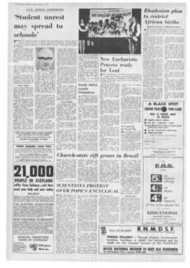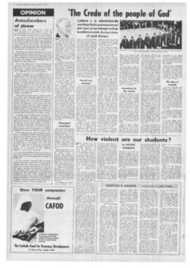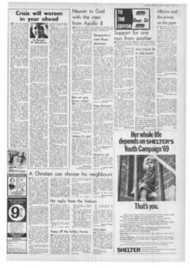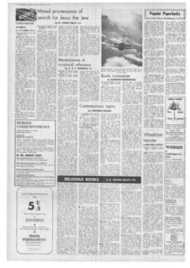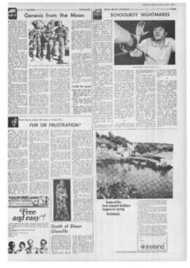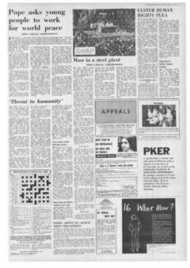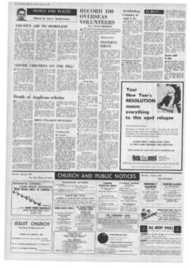Page 4, 3rd January 1969
Page 4

Report an error
Noticed an error on this page?If you've noticed an error in this article please click here to report it.
Tags
Share
Related articles
Can Mass Still Be Said In Latin?
Question & Answer Conducted By Fr. John Symon
Question & Answer Conducted By Fr. John Symon
Question And Answer
The Liturgy And The People Communion Outside Mass
QUESTION & ANSWER
conducted by Fr. JOHN SYMON
Question. I heard recently about a Catholic church in this country where at least occasionally the whole congregation recites the Canon of the Mass with the officiating priest. This seems an unusual procedure and I would he grateful if you would comment on it.
IC., Perth, Scotland.
Answer. I have heard reports of this practice from the United States and an Anglican friend, who spent last Holy Week in Holland, assures me categorically that on Maundy Thursday he took part in a Mass at which the whole congregation, those at least who knew sufficient Dutch, joined in singing a Canon which a poet had specially composed for the occasion.
By the way, on Holy Saturday night, the same congregation and their friends filled the church to overflowing for two separate Easter Vigils (from 9.11 p.m. and again from midnight to 2 a.m.), a level of attendance which suggests that. whatever criticism may be made of certain details, the general tone of Dutch Catholic life is very sound.
While I do not doubt this week's enquirer, who asserts that this practice has occurred once or twice in our own country, I am sure
it is not a regular custom anywhere in Britain. If it were, by now someone would have gone off hotfoot to inform the local bishop
and, however liberalminded the bishop were. he would feel bound to intervene. as indeed happened in Holland.
Why should the bishop interfere? In just four years we have translated the whole Mass. Canon included, into English and at this very moment we are preparing to introduce three alternative Canons in English.
In these new Canons the laity are encouraged to intervene after the consecration with a beautiful acclamation. Why end the reforms here? The prayer of consecration concerns the people as much as the priest. It might be asked if the next logical step is not to have the Canon recited by all the baptised together.
The Mass is the sacrifice both of Christ our ()Ord and of all the members of His Body, the whole priestly People of God. Fair enough, but it does not follow that everyone should say or sing each of the Mass prayers. What does follow is that, so far as is reasonably practical, everything should be done in such a way that its meaning will be readily
intelligible to all present.
If someone is reading a lesson, there is no reason for the rest of us to read it with him; we should simply sit and listen as a community, Neither are we to grudge the choir their role of singing the more complicated section of the music, the antiphons that vary from day to day; here again we listen.
On the other hand, when it is a question of the prayers and chants that make up the unvarying Canon of the Mass, then we should join in. This is our part; it belongs to us all.
Just as some parts of the Mass belong to the choir and other parts belong to the reader and other parts belong to the whole congregation, so by his ordination the priest is deputed and empowered to say the Eucharistic Prayer of consecration (what we usually call the Canon) on behalf of all. It is his duty, his office, his own part in the community's worship.
Because of the defective liturgical forms we used to have, the priest would do all sorts of things which were not his part at all; along with his own part of the Mass, he would carry out the deacon's part, the reader's part, the choir's part
and even the congregation's as well.
This was a mistake and mercifully it is now recognised as such. Just as the truly Catholic principle is to have worship in the Iangage of the people, so it is also a Catholic principle that each member of the Body of Christ fulfil his own role and not anyone else's.
Various accidents of history had led to the unCatholic and untraditional innovation of using a dead language and the very use of Latin led perforce to the priest having to act as a one-man-band, not only performing his own part but taking over everyone else's too.
The idea of everyone joining the priest in saying the Canon is an error, the opposite extreme from the defective liturgical form we knew until recently, but an error none the less.
As article 28 of the Council's Liturgy Constitution says. in liturgical celebrations, whether we are simply acting as members of the baptised people of God or we are also acting as part of the ordained clerical ministry, we should carry out our own role, we should carry out the whole of it, but we should not infringe on anyone else's part.
blog comments powered by Disqus



